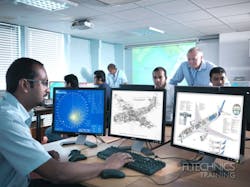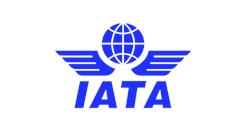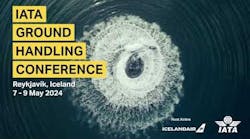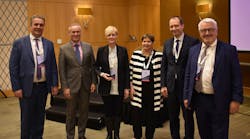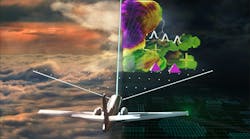More than 1,600 orders for the Next Generation aircraft – Boeing 787, Airbus A380 and A350 – are currently placed by airlines worldwide, with the ASPAC region as the leading market for the wide-body aircraft deliveries. The increasing popularity of new generation aircraft truly reflects the change in the overall industry philosophy and the prevalent fleet management strategies. Needless to say, MROs need to react to the changes and look for different approaches to aircraft maintenance and support services. The place where new generation high-tech maintenance specialists are being cultivated is the classroom, therefore sophisticated technologies and topnotch facilities are becoming an integral part of modern maintenance training programs.
‘Next generation aircraft are packed with new technologies and differ from previous generation pieces in many respects. For example, 20% of the Airbus A380 airframe is made of composite materials. Both Boeing 787 and Airbus A380 (or A350) are equipped with an Integrated Modular Interface – a real-time computer network airborne system. Even the concept of aircraft engines is changing – Rolls-Royce and General Electric B787 engines share the same standard electrical interface that allows relatively fast and cheap shift between the engines of different manufacturers. All of these technological innovations call for innovative MRO solutions and thus shapes technical training. After all, modern aviation maintenance institutions must be able produce competent maintenance personnel with up-to-date knowledge and experience,’ commented the Deputy Head of FL Technics Training Dainius Sakalauskas.
Modern international technical training centres have significantly advanced since the dawn of the B747 era. In order to meet the MRO market demands and trends, these centres are shifting their programs from ‘book-based’ to ‘computer-based’. Nowadays modern classrooms are packed with highly sophisticated computer systems containing a variety of different simulation programs. Since the job of an aircraft maintenance specialist involves using a computer on a daily basis, these programs provide the students with the in-class practical experience – something which would have been very hard to gain in the 20th century training schools. Another innovation which contributes to the ‘initial’ practical of young technicians and engineers is 2D/3D visualizations – with their help future maintenance personnel can now scrutinise every single part of any airplane type. One of the most important and useful learning tools based on new technologies is online conferences and webinars. These online solutions help training organizations to improve and diversify their programs and courses by cooperating with the world’s leading MRO specialists, who can share their expertise from any place they are working at.
Modern technical training centres are becoming more interactive and more practice-orientated, not unlike flight schools where students can develop their practical skills with the help of Full Flight Simulators (FFS). Aside from preparing new technicians and engineers, the centres also offer special programs for aircraft maintenance organisations.
‘It is a common practice for MRO companies to send their maintenance personnel to a Technical Training school in order to change or upgrade the qualification of its employees. At this point, modern centres have also come up with a number of different innovative solutions such as E-Profile – a certain online access to a technician’s or an engineer’s qualification records. This helps the MROs to plan and optimize the retraining strategy for the maintenance personnel and be confident in their up-to-date qualification thus ensuring the quality and safety of their services,’ concludes Dainius Sakalauskas.
About FL Technics Training:
FL Technics Training is a provider of technical training for the aviation industry. The company offers comprehensive training services including basic training and examination, aircraft type training and specialized training for aircraft maintenance technicians as well as administrative and management personnel. FL Technics Training is part of an integrated aircraft maintenance and repair organization (MRO) FL Technics.
Based in Vilnius, Lithuania, FL Technics Training is certified as a European Aviation Safety Agency (EASA) Part-147 training organization providing courses for basic, aircraft type training and customized training programs designed according to individual client requirements. The company serves a wide range of customers from Europe and the CIS (Poland, Romania, Ukraine, Moldova, Russian Federation etc.), Asia (including South Korea, Pakistan, Kazakhstan, Tajikistan, and etc.), Africa, Cuba and other regions.
Drawn up in accordance with the requirements of the EASA, FL Technics Training programmes cover four areas: basic training, aircraft type training, specialized aviation training and consulting services. FL Technics Training offers training for diverse aircraft types: Airbus A318/A319/A320/A321, Airbus A380/340/330, ATR 42 - 200/300, ATR 72 - 100/200, Boeing 737 - 300/400/500, Boeing 737 - 600/700/800/900, Boeing 757 - 200, Boeing 767 - 200/300, Boeing 747/777/767, Saab – 340, Saab – 2000, Bombardier CL-600-2B19.
FL Technics Training offers specialized training programs of general interest for technical as well as administrative personnel from Engineering and Planning, Quality system, EASA Regulation Part-145 and Part-M to Fuel Tank Safety courses. Training programs can be adapted to meet the specific needs and requirements of clients.
More than 2000 students for over 40.000 hours per year are trained at the company's theoretical courses in Moscow, Tyumen, Alma Ata, Vilnius and London. Training on the job is executed in Vilnius, Kiev and London.
For further information please visit website http://www.fltechnicstraining.com/
